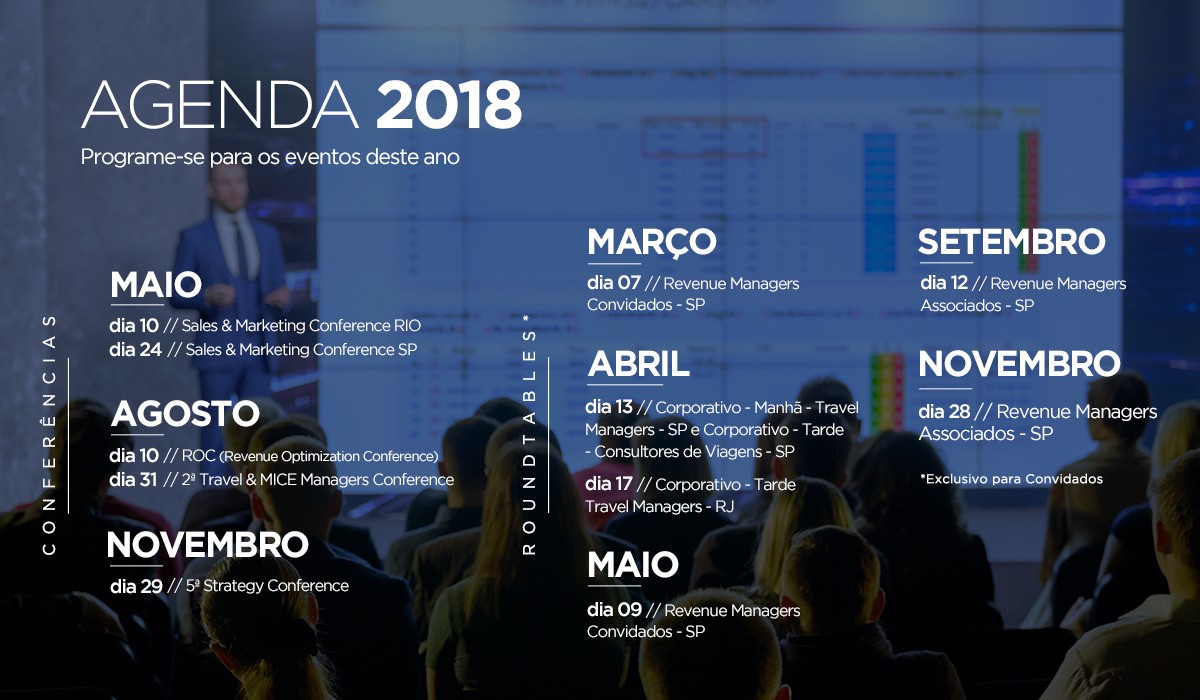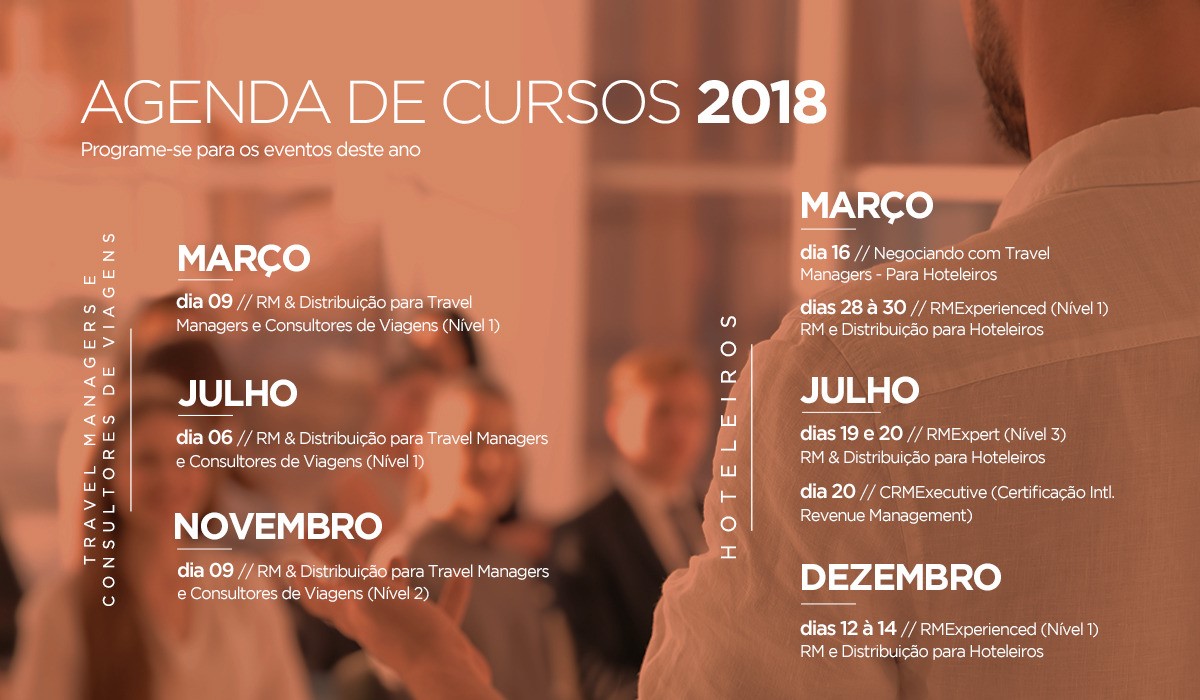Caros Leitores,
Agora é pra valer! 2018 realmente começou com o fim do Carnaval semana passada, com o Fórum Panrotas e o LACTE chegando, e com diversos eventos educacionais independentes e de associações programados até o fim deste ciclo.
O mercado volta a contratar, mas a opinião que mais ouço dos gestores das vagas é que falta gente capacitada para as mesmas. Minha dúvida é: falta gente capacitada, ou falta gente com atitude, com garra e capacidade de se colocar no lugar do outro, ter empatia, de fazer coisas além do esperado e do job description? Gente que não seja braço-curto, preguiçosa de ajudar?
Se eu estivesse contratando, buscaria as pessoas mais por suas atitudes, valores, formação educacional e postura do que por sua bagagem e experiência profissional – porque a capacidade de adaptação e aprendizagem destas pessoas costuma ser muito maior, indispensáves no mundo insano de hoje. Em geral, elas aprendem rápido e são dedicadas, versáteis, se doam e absorvem o conhecimento e as habilidades profundamente, incorporam a empresa e sua posição.
E essa é a cara que nossos viajantes ficam quando os senhores OBTs fazem release de ferramenta sem testarem conosco (clientes) antes!

Sobre a troca constante de Gerentes de Contas
É certo que muitos Compradores e Gestores de Viagens não respondem a um simples e-mail, Whatsapp, não atendem uma ligação – e os colegas fornecedores, principalmente os Hoteleiros, muito reclamam desta falta de atenção.
No entanto, não posso deixar de chamar a atenção dos colegas fornecedores para um fato que venho notando nos últimos 6 meses: uma troca CONSTANTE de gerentes de contas, sendo que TODOS pedem reunião para se apresentar, e pior ainda: pedem para o cliente explicar tudo de novo o que está acontecendo, como pode ajudar, etc. Me pergunto se estas empresas possuem um processo de handover, de troca de carteiras de mãos, porque sinceramente é muito chato ter que ficar repetindo as mesmas coisas – a gente até aceita um novo gerente de contas, mas no mínimo ele já tem que entrar “pedalando” junto com a gente. Por mais que o anterior tenha se desligado ou sido desligado de um dia pro outro, deve haver um sistema interno de CRM (Customer Relationship Management) para que o novo responsável se atualize e não tenha que ficar nos perguntando tudo (para citar apenas um dos benefícios de se ter um sistema de CRM).
Pensem que nós temos centenas de fornecedores para gerenciar, receber, analisar relatórios, renegociar – além de todas as reuniões internas (sim, estamos em Procurement, FInanças , RH mas temos MUITAS reuniões e treinamentos internos). Além disso, muitos de nós somos responsáveis por uma região inteira (como América do Sul, América Latina, Américas), por outras carteiras – simplesmente não dá para receber 3 gerentes de contas de uma mesma rede em 6 meses.
Client/Account/Business Review de TMCs – um modelo ultrapassado?
Outro dia, conversando com uma executiva de uma grande TMC, discutíamos sobre a utilidade atual, e o modelo de Client Review mais adequado para os novos tempos de Gestão de Viagens.
Minha opinião é que este documento é muito importante sim, mas o cliente precisa deixar claro a periodicidade mais útil (trimestral, semestral, anual) e as informações realmente necessárias para a TMC compilar. Afinal de contas, o que é feito com estas informações? Para que exigir do seu fornecedor a montagem de um super documento se não é compartilhado com ninguém, se nenhuma ação é tomada, se você mexe mais no computador e no celular durante a apresentação do que presta atenção no apresentador (uma tremenda falta de respeito com qualquer pessoa, que se dedica a fazer aquilo)?
Receber um Account Review apenas porque está no contrato? Ou apenas por que você é o cliente?
Por outro lado, a TMC tem a obrigação de cuidar bem dos dados da base que produz o documento, prestar atenção em detalhes (por exemplo, não chegar com nome de outro cliente na apresentação, consistência de cores e informações, limpeza visual, eliminar remarcações e reembolsos do cálculo do ATP) e torná-lo atraente e ÚTIL.
Cinco slides bem feitos e diretos ao ponto a cada 6 meses geralmente são muito mais valiosos do que apresentações de 40 slides a cada 3 meses ( para inglês ver ).
A subida abusiva de IPTU em algumas capitais
Para quem não viu, muitas cidades brasileiras sofreram um reajuste vergonhoso no IPTU, incluindo o pobre Rio de Janeiro. Leia uma das notícias aqui
A bomba chegou em Janeiro 2018, ou seja, depois das RFPs da maioria dos clientes terem sido encerradas – e vai explodir no colo dos Hoteleiros, infelizmente. Com isso, provavelmente as tarifas públicas serão impactadas, já que as Corporativas não podem ser mais revistas (compradores, atenção à aplicação das tarifas negociadas em cada reserva, para não “levarem chapéu”) e em sua grande maioria são válidas até Dezembro deste ano. Para os que negociaram apenas descontos sobre a BAR, uma má notícia, visto que a BAR inevitalvemente vai subir para compensar o prejuízo desta subida de imposto predial.
De qualquer forma, é importante ressaltar que esta cobrança absurda não é generalizada, está presente apenas em algumas (relevantes) cidades. Por isto, recomendo atenção e preparo para lidar com redes que tentem aproveitar a deixa para rever todo o tarifário, quando o problema está isolado em algumas praças.
Para saber mais sobre Hotelaria, leia o blog da minha amiga Gabriela Otto.
Entrevista para a Revista Eventos
Pela terceira vez, o Portal Eventos entrevistou 42 experts no setor para dividirem um panorama do ano que passou (2017, no caso) e dar seus palpites sobre o ano vindouro (2018). Abaixo compartilho minhas respostas de maneira completa – a matéria, com a opinião dos outros 41 colegas, pode ser lida aqui.
Por Fernão Loureiro:
1. O que mais impactou a indústria de eventos nos últimos 12 meses? A depressão econômica sem dúvida, creio que uma competição acirrada por clientes (nunca fui tão abordado por agências de marketing e eventos)
2. Quais as perspectivas da indústria no biênio 2018/19? Retomada de viagens de incentivos em destinos mais caros, eventos mais grandiosos – mas a marca da austeridade imposta nos últimos anos deve influenciar os profissionais, o que é bem positivo sob o ponto de vista de um comprador como eu
3. Se você pudesse mudar um aspecto na indústria de eventos e turismo, o que seria? Não mudaria, acrescentaria mais oportunidades de qualificação para a base em parceria com o poder público (como quando ocorrem grandes eventos nacionais).
4. O que você gosta mais na indústria de eventos? A paixão das pessoas que nela atuam, é incrível ver a maioria dos profissionais produzindo eventos e incentivos espetaculares, muitas vezes com recursos limitadíssimos (humanos, tecnológicos, financeiros). A criatividade e competência dos profissionais de eventos brasileiros são admiráveis
5. Qual é o maior problema de nossa indústria? A baixa remuneração da maioria dos atores da indústria
6. Qual o desafio mais significativo que acredita irá enfrentar nos próximos anos? Conscientizar os grandes executivos , e especialmente a gerência média, que um evento deve ter indicadores de performance e ROI financeiro e não-financeiro (mesmo quando é apenas um evento de lançamento/fixação de marca, relacionamento institucional, etc).
7. Profissionais de eventos devem prestar atenção extra para as questões sociais, sustentabilidade, segurança etc.? Sem dúvida alguma! Até como valor agregado para seus clientes, que muitas vezes não se lembram destes fatores. Como consultores, devem nos dar dicas, ideias e facilitar a criação/execução de ações voltadas para estes temas cada vez mais valorizados pelos consumidores
8. Qual será a próxima “grande sacada” em eventos? Participação virtual 360º em feiras. Por exemplo, visitar uma feira em NYC estando em meu escritório em São Paulo, interagir com os expositores e até mesmo ter reuniões – tudo com realidade virtual.
9. Que inovações tecnológicas você acredita que irão impactar a indústria nos próximos anos? A participação virtual pensando muito grande, mas olhando o micro, ainda temos desafios em RSVP, seleção, negociação e contratação de espaços, qualificação de mão-de-obra mais simples. Creio que plataformas que permitam uma organização de evento pequeno ou de médio porte sejam a inovação que a indústria brasileira mais precisa no momento.
10. Que novas competências devem aprender os profissionais de eventos? Entender muito de tecnologia, conhecer a fundo seu mercado (especialmente empresas que forneçam serviço especializado e como conectá-la com outro provedor para oferta de um diferencial no evento – cada vez mais comum termos fornecedores ultraespecializados que fazem parte do serviço, precisam se conectar a outro para entregar tudo o que o cliente precisa) e ter inteligência emocional para lidar com tanto stress e não perder seu maior ativo: capacidade de empatia, transmitir energia e entregar um evento inesquecível de bom.
—————————————————————————————
ENGLISH VERSION
Dear Readers,
Now it’s for real! 2018 restarted with the end of Carnival last week, with the Panrotas Forum and LACTE coming up, and with several independent educational events and from associations scheduled until the end of this cycle.
The market recruits again, but the opinion I most hear from job managers is that they lack people who are qualified for them. My question is: do we lack experienced people, or do we lack people with attitude, with the ability to put ourselves in another’s shoes, empathize, do things beyond the expected and the job description? Guys who are not lazy to help?
If I were hiring, I would seek people more for their attitudes, values, educational background and posture than for their baggage and professional experience – because their ability to adapt and learn is often much greater, indispensable in today’s insane world. In general, they learn quickly and are dedicated, versatile, give themselves and absorb knowledge and skills deeply, embody the company and its position.
Happy new relationships for all (employees and employers)!
About the constant exchange of Account Managers
It is true that many Buyers and Travel Managers do not respond to a simple email, Whatsapp, they do not answer a call – and fellow suppliers, especially Hoteliers, very much complain about this lack of attention. However, I can’t fail to draw the attention of my fellow suppliers to a fact that I have been noticing in the past 6 months: a CONSTANT exchange of account managers, with ALL asking to meet us to introduce themselves, and worse: they ask the client to explain all over again what is happening, how they can help, etc.
I wonder if these companies have a handover process, of exchanging handbags, because honestly it is very annoying to have to keep repeating the same things – we even accept a new account manager, but at the very least he already has to enter ” pedaling “along with us. Although the previous one has been fired or has resigned overnight, there must be an internal Customer Relationship Management (CRM) system for the new manager to update him/herself and not have to ask us everything (to name just one of benefits of having a CRM system).
Think that we have hundreds of vendors to manage, host meetings with, analyze reports, renegotiate – in addition to all internal meetings (yes, we are in Procurement, Finance, HR but we have MANY internal meetings and trainings). In addition, many of us are responsible for a whole region (such as South America, Latin America, the Americas), for other portfolios – we just can’t get 3 account managers from the same company in 6 months, there is no continuity in management.
Client / Account / Business Review of TMCs – an Outdated Model?
Another day, talking to an executive from a large TMC, we discussed the current utility, and the most appropriate Client Review model for the new times of Travel Management. My view is that this document is very important yes, but the client needs to make clear the most useful periodicity (quarterly, semiannual, yearly) and the information really necessary for TMC to compile.
After all, what is done with this information? So why do you require your supplier to create a super document if it is not shared with anyone, if no action is taken, if you manage more on the computer and on the cellphone during the presentation than paying attention to the presenter (a tremendous lack of respect with anyone who is presenting something)? Do you get an Account Review just because it is in the contract? Or just because you are the customer?
On the other hand, the TMC has an obligation to take good care of the data on the basis of the document, to pay attention in details (for example, not getting another customer’s name in the presentation, color and information consistency, visual cleaning, remove exchanges and refunds from the ATP calculation) and make it attractive and HELPFUL. Five well-made, point-to-point slides every 6 months are usually much more valuable than 40-slice presentations every 3 months.
The abusive rise of IPTU in some capitals
For those who did not see it, many Brazilian cities suffered a shameful readjustment in the IPTU (urban construction tax), including the poor Rio de Janeiro. Read one of the news here.
The bomb arrived in January 2018, that is, after most of the customers’ RFPs were shut down – and it will explode on the laps of hoteliers, unfortunately.
With this, probably the public rates will be impacted, since the Corporations can’t be adjusted now (buyers, attention to the application of the negotiated rates in each reservation) and the great majority are valid until December of this year . For those who have barely traded discounts on BAR, bad news, since BAR will inevitably go up to offset the loss of this property tax hike.
In any case, it is important to note that this absurd collection is not generalized, it is present only in some (relevant) cities. Therefore, I recommend attention and preparation to deal with networks that try to take advantage of the leaves to review the entire negotiation, when the problem is isolated in some places.
For more about Hotels, read my friend’s blog – Gabriela Otto
Interview for the Events Magazine
For the third time, the Events Portal interviewed 42 industry experts to share a panorama of the past year (2017) and give their guesses about the coming year (2018). Below I share my answers in a complete way – the matter, with the opinion of the other 41 colleagues, can be read here.
By Fernão Loureiro:
- What has most impacted the event industry in the last 12 months? The economic depression no doubt, I believe a fierce competition for customers (I’ve never been so approached by marketing and events agencies)
- What are the industry perspectives for the biennium 2018/19? Resumption of incentive travel in more expensive destinations, bigger events – but the brand of austerity imposed in recent years should influence professionals, which is very positive from the point of view of a buyer like myself
- If you could change one aspect in the event and tourism industry, what would it be? It would not change, it would add more opportunities of qualification for the base in partnership with the public power (like when great national events occur).
- What do you like best in the event industry? The passion of the people who work in it is incredible to see most professionals producing spectacular events and incentives, often with very limited resources (human, technological, financial). The creativity and competence of Brazilian event professionals are admirable
- What is the biggest problem in our industry? The low pay of the majority of industry actors
- What is the most significant challenge you believe you will face in the coming years? Raise awareness among large executives, and especially middle management, that an event should have performance indicators and financial and non-financial ROI (even when it’s just a brand launch event, institutional relationship, etc.).
- Should event professionals pay extra attention to social issues, sustainability, safety, etc.? Undoubtedly! Even as added value to their customers, they often do not remember these factors. As consultants, they should give us tips, ideas and facilitate the creation / execution of actions focused on these themes increasingly valued by consumers
- What will be the next “big balcony” in events? 360º virtual participation in trade fairs. For example, visiting a trade show in NYC while in my office in Sao Paulo, interacting with exhibitors and even having meetings – all with virtual reality.
- What technological innovations do you believe will impact the industry in the coming years? The virtual participation thinking very great, but looking at the micro, we still have challenges in RSVP, selection, negotiation and contracting spaces, qualification of labor simpler. I believe that platforms that allow a small or medium-sized event organization are the innovation that the Brazilian industry needs most at the moment.
- What new skills should event planners learn? Understand a lot of technology, know your market in depth (especially companies that provide specialized service and how to connect it with another provider to offer a differential in the event – more and more common terms for ultra-specialized suppliers that are part of the service, need to connect to another to deliver everything the client needs) and have emotional intelligence to deal with so much stress and not lose their biggest asset: empathy ability, transmit energy and deliver an unforgettable event.


